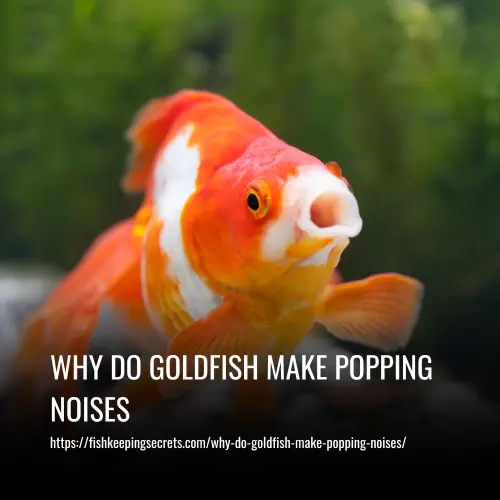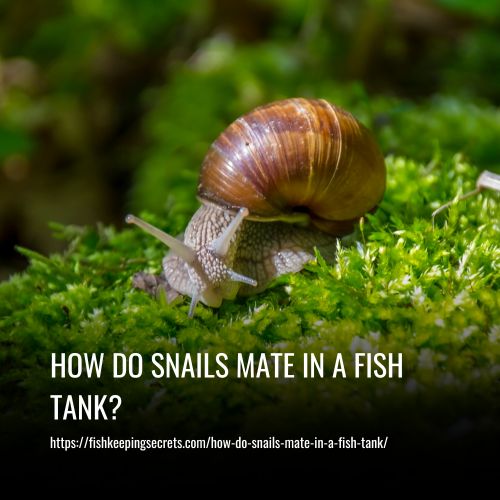Why Do Goldfish Make Popping Noises
This post contains affiliate links. As an Amazon Associate, we earn from qualifying purchases.
Goldfish may make popping noises due to a condition called swim bladder disorder. This disorder affects the fish’s swim bladder, causing it to fill with air and making the fish float or sink uncontrollably. The popping noise is caused by the fish releasing air from its swim bladder.
Swim bladder disorder can have various causes, including overfeeding, poor water quality, or a bacterial infection. It is important to address the underlying cause and provide proper care for the goldfish to alleviate this condition.
Reasons why a goldfish may make popping noises:
- Swim Bladder Disorder
- Air Intake
- Mouth and Gill Irritation
- Tumors or Growths

Reasons Why A Goldfish May Make Popping Noises
There are several potential reasons why a goldfish may make popping noises:
1. Swim Bladder Disorder
Swim bladder disorder is a common condition in goldfish that can cause them to make popping noises. It occurs when the swim bladder, a gas-filled organ that helps the fish control its buoyancy, becomes damaged or blocked. This can lead to abnormal swimming behavior and popping noises.
2. Air Intake
Goldfish have a tendency to gulp air from the water’s surface, especially when they are stressed or experiencing poor water quality. This excessive air intake can result in popping noises as the fish expels the built-up air.
3. Mouth and Gill Irritation
If a goldfish has mouth or gill irritation, it may make popping noises as it tries to clear its respiratory passages. This can be caused by various factors, including poor water quality, parasites, or infections.
4. Tumors or Growths
In some cases, popping noises in goldfish can be caused by tumors or abnormal growths in the fish’s respiratory system. These growths can interfere with normal breathing and cause the popping sound.
It is important to observe the goldfish closely and take appropriate action if popping noises persist or if other symptoms, such as difficulty swimming or eating, are present. Consulting with a veterinarian or an experienced fish keeper can help determine the underlying cause and provide appropriate treatment.
Prevention of Popping Noises in Goldfish
To prevent popping noises in goldfish, there are a few steps you can take:
1. Maintain proper water quality
Ensure that the water in the tank is clean and properly filtered. Regular water changes and testing for ammonia, nitrite, and nitrate levels can help prevent water quality issues.
2. Avoid overfeeding
Overfeeding can lead to digestive issues and gas buildup in the fish, which may result in popping noises. Feed your goldfish small, regular meals and remove any uneaten food to prevent overfeeding.
3. Monitor tank temperature
Goldfish prefer cooler water temperatures, typically between 65-75 degrees Fahrenheit. Fluctuations or extremes in temperature can stress the fish and contribute to popping noises. Use a reliable thermometer to maintain a stable temperature in the tank.
4. Provide proper aeration
Ensure that the tank has adequate oxygen levels by using a filter, air stone, or other forms of aeration. Proper oxygenation can help prevent gas buildup in fish, reducing the likelihood of popping noises.
5. Observe for signs of illness
Popping noises may indicate underlying health issues in goldfish, such as swim bladder disease or bacterial infections. Monitor your fish for any other symptoms of illness, such as loss of appetite, changes in behavior, or visible abnormalities. If you notice any concerning signs, consult a veterinarian or experienced fish keeper.
By following these guidelines, you can help maintain a healthy and comfortable environment for your goldfish, reducing the likelihood of popping noises and promoting their overall well-being.
FAQs
The popping noises themselves are not harmful to the goldfish. However, if a goldfish is consistently making popping noises, it could indicate a problem with the water quality or oxygen levels in the tank, which can be harmful to the fish.
To prevent your goldfish from making popping noises, ensure that they have access to well-oxygenated water and provide them with a varied diet to prevent them from gulping air at the surface of the water.
If your goldfish suddenly starts making popping noises, it could be a sign of a sudden change in the water quality or oxygen levels. It is important to monitor the tank and take action to improve the water conditions for your fish.
Continuous popping noises from a goldfish can lead to health issues if the underlying cause, such as poor water quality, is not addressed. It is important to address the root cause to ensure the health and well-being of your goldfish.
While you cannot train a goldfish in the same way you can train other pets, you can create an environment that discourages them from making popping noises by maintaining good water quality and providing them with a varied diet.
Yes, it is normal for goldfish to make popping noises. It is a natural behavior for them to gulp air to regulate their swim bladder and maintain buoyancy.
Conclusion
In conclusion, the popping noises made by goldfish are a fascinating phenomenon that can be attributed to a variety of factors. It is likely that the noises are related to the swim bladder, gas release, or courtship behavior. While more research is needed to fully understand the reasons behind these sounds, it is clear that they play a significant role in goldfish communication and behavior.
Understanding the science behind these popping noises can help pet owners better care for their goldfish and ensure their well-being. It also provides valuable insight into the evolutionary adaptations of these fascinating creatures.



